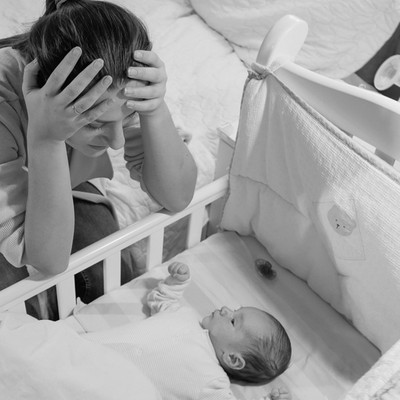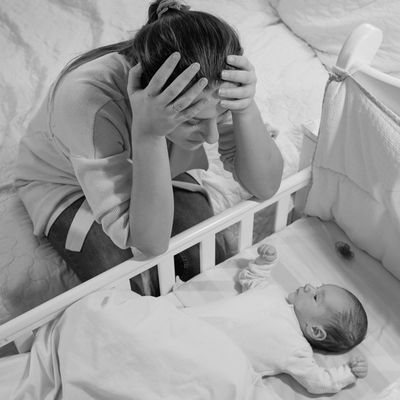

What You Need To Know About Post-Natal Depression
All products on this page have been selected by our editorial team, however we may make commission on some products.
What is post-natal depression & what are the symptoms?
“Post-natal depression is a depressive illness which affects around one in ten women after they have a baby. Symptoms can be similar to general depression, including low moods, which tend to last at least two weeks after birth. Depending on the severity, you may also struggle to look after yourself and your baby, and might find simple tasks difficult to manage. While brand-new mums with one- to three-week-olds are most vulnerable to post-natal depression, it can occur anytime during a baby’s first year. However, the signs are not always obvious. For example, while teary sadness is a symptom, it’s not a universal sign. More commonly, a new mum will experience nagging guilt, high levels of anxiety, a mind that won’t stop running, exhaustion, and a deep sense of self-doubt, such as feeling like you’re the worst mum ever or like your baby might be better off without you.” – Paediatrician Dr Harvey Karp & co-founder of Happiest Baby
“For those with post-natal depression, feelings of joy and confidence don’t develop in those early weeks or may disappear within the first few months. When anxiety and low mood carry on past baby’s first two weeks or appear later in the first year, this can signal post-natal depression. Other symptoms include a persistently low mood, a sense that other mothers can cope but you can’t, and experiencing helplessness and hopelessness. You may be exhausted when you wake up in the morning, cry a lot and feel empty and sad. There could be guilt and shame that you’re not happy or don’t love your baby enough or even fear that you might hurt your baby. It’s important to remember that you are not on your own and to let others know how you are reacting and get help.” – Child psychologist Dr Claire Halsey
What’s the difference between post-natal depression & ‘baby blues’?
“Many new mothers experience a mild case of ‘baby blues’ within two to three days after giving birth. Feelings of disappointment, sadness, restlessness, and anxiety emerge as your body deals with the physical and hormonal upheaval of birth. Fortunately, these are all normal – and fleeting – feelings. Usually, baby blues gradually fade by themselves within a week or two. But if those feelings persist (and perhaps include guilt, racing and/or intrusive thoughts, gnawing anxiety, fears about your ability to parent, and even the feeling like you want to hurt yourself or run away), please reach out to your healthcare provider. Your baby blues may be post-natal depression. Post-natal depression is more severe, lasts longer, and requires expert help. Support, therapy, and medication can be enormously helpful.” – Dr Harvey
Are there common causes or triggers?
“Having a baby is a life changing event and whilst joyful, it can be stressful and challenging. There are not necessarily triggers for post-natal depression, however some factors mean a parent is more vulnerable, such as a previous history of depression, little support and having pregnancy complications. If there are past experiences which increase your vulnerability, getting a support system in place before your baby is born can be useful.” – Dr Claire
Are there different types & severities?
“As with any struggle concerning mood and emotions, the amount of distress and how much this affects everyday life can vary in strength and how long it lasts. Post-natal depression can include a range of anxieties and low moods. It’s sometimes confused with post-natal psychosis which affects about one in 500 mothers and is a serious mental illness starting soon after the baby’s birth. Signs include hallucinations, delusions and severe mood swings. Post-natal psychosis should be treated right away as an emergency. If these signs appear, get in touch with your GP, midwife or other health professional involved in your care or call 111 for advice and assistance.” – Dr Claire
Can you prevent it from happening?
“It’s not possible to prevent post-natal depression occurring and it’s certainly not a parent’s fault for having this experience. However, it is possible to reduce the chance of experiencing post-natal depression by doing all the things that go along with a healthy social, emotional and physical lifestyle. Keeping active, eating well, spending positive time with family and friends and seeking help when you need it are all helpful in supporting emotional and physical health.” – Dr Claire
How can it affect your relationship with your baby?
“Parents of a new baby are building the bond with their child in everything they do and say, and it can be particularly difficult to be responsive if you feel unwell in yourself either physically or emotionally. This can affect how close you and your baby are and may influence your bond in those early months. If you’re concerned about the bond with your baby, seek advice and support. Your midwife or health visitor, for example, can help.” – Dr Claire
Can fathers get it, too?
“It’s now well recognised that fathers can also experience pre- and post-natal depression with signs including low mood, irritability, feelings of helplessness and withdrawal. It’s important for fathers, as well as mothers, to share these feelings with a partner, friend, family member or professional and seek help if there are concerns that this is affecting family life and relationships.” – Dr Claire
What are some of the myths around post-natal depression that need to be debunked?
“There’s a common misconception that post-natal depression is all about hormones. It’s not. After all, mums of adopted children can have postnatal depression – and so can dads. The research is clear: prolonged infant crying and sleep deprivation are associated with higher rates of post-natal depression. Having an unsupportive partner and/or no support system to help you can greatly contribute to your risk of post-natal depression, too.” – Dr Harvey
“One myth is that a parent with post-natal depression is unloving or a bad parent. No one chooses to have this condition and parents experiencing it are no different from others in the love and commitment they want to give, but may be hampered from doing so temporarily by this mental ill health. Another myth is that post-natal depression will go away without help. Professional help and the support of family and friends is a positive and vital way to help a parent recover from it.” – Dr Claire
What treatment options are available?
“A wide range of services are available for a parents concerned about their post-natal mental health. The best way to get help specifically for this difficulty is to contact your GP, health visitor or local services for advice and support. Help can include counselling, psychological or medical treatment and support groups and phone help lines. Your midwife or health visitor will ask you about how you are feeling when they visit, so do speak openly about your emotions and fears. These professionals will recognise your situation and know how to get help, often recommending you see your GP as well as linking you into local services and groups where you can come together with others in similar situations for support. Assistance is also available through helplines such as the Association for Post-Natal Illness, they can put you in touch with mothers who have recovered from post-natal depression. Another possible treatment for post-natal depression is anti-depressants. However, the professional guiding you will discuss all the treatment options with you.” – Dr Claire

MILORAD KRAVIC/ISTOCK
Is there anything you can do yourself to ease the symptoms?
“Eat well. It needn't be time-consuming – have lots of healthy snacks to hand and fill up your freezer with nutritious, easy-to-make meals when you can. Nutritious, colourful foods will feed your body and can holistically help you. Biscuits and chocolate will only give a short energy burst followed by a sugar crash, so have your chocolate bar if you feel that is what you fancy, but be sure to balance it with a decent meal after filled with protein, carbs and lots of vegetables. Also, sleep tends to be especially elusive in the first few months, so it’s important to rest when possible. Mums who get the least sleep experience the most depressive symptoms. If possible, divide baby duties with your partner where you can, so both of you can get a few hours here and there. When the baby sleeps, try to take a nap too.
“A full-body bootcamp might be out the window – at least at first – but don't underestimate the benefits of popping your baby in your baby carrier, heading outside and moving your body. Walking significantly effects the symptoms of depression positively. Don't overdo it in the early days, but a short walk or stretching can release your endorphins, reduce your cortisol levels (stress hormones), which will make you feel better. You should also try to take some time out for yourself – it’s not selfish. It’s actually one of the best things you can do to give your mental health a boost. Grabbing a shower, a hot cup of coffee, listening to a podcast or music, reading a book, or even a short walk outside without baby can give you a little time to remember that you are still you.
“I would also recommend starting a mood journal to record your experiences and feelings which can be a useful tool in understanding and bolstering your mindset. Write down what you think you have to do later and then leave it until later. Even better, ask someone else to help you. Lastly, be specific about what you need – and try not to get caught up in whether you’re doing it 'properly'. If someone visits, ask them to pop the kettle on or cuddle the baby while you grab a quick shower. Learn to say yes to help and no to activities. If someone offers you a meal, say yes. Accept help and repay the favour in the future.” – Sarah Campus, PT, nutrition coach & founder of Ldn Mums Fitness
How can you support a friend or loved one with post-natal depression?
“It can be upsetting seeing a friend or loved one going through the distress and challenge of postnatal depression. However, they need your calm supportive presence more than ever. Your ability to listen, empathise and do the simple things like keep them company will be invaluable. Practical help is important too as they may find motivation is low to do everyday tasks such as shopping and getting to postnatal appointments. You could also point them in the direction of helpful resources – Triple P for Baby is extremely useful. It's available as an online programme that will help new parents prepare for the arrival of their new baby, providing tips and survival strategies to make the post-natal experience as positive as possible.” – Dr Claire
Here, Lulu Adams – mum of three and pre- and post-natal exercise specialist – shares her experience…
I experienced post-natal anxiety and depression after the birth of my second child. It was 2018 and I experienced panic-induced hopelessness, severe levels of self-criticism, loss of appetite, waking up dreading the day ahead and wanting to sleep the whole time – I know a lot of people experience insomnia, but I was the opposite. It was a way of escaping the feelings. Early nights, naps, whatever I could get, I took. I was also constantly on the edge of tears and experienced anxiety – it was when I developed panic attacks that I realised something was really wrong.
Thankfully, it didn’t affect my relationship with my babies. They kept me going and are what drove me to ask for help. When things were bad, I pushed on, doing everything that was needed to look after them, but it was hard because I didn’t feel like I was doing a great job. It felt like I was merely surviving. However, it was the thought that I was letting them down that absolutely broke me, including the facade I was putting up for everyone else.
Post-natal depression has affected my memory. Whether it’s because I was on medication at the time, or just stuck in my head ruminating over thoughts and feelings, I struggle to remember the early days with my second daughter, which is heart-breaking. I told my husband about this and how guilty it made me feel, and asked him if I was ‘totally out of it’ but he reassures me I was there being the fully loving mum I wanted to be.
Going to my GP was the first step. However, a lot of GPs will often go straight to anti-depressants (they might offer CBT too) but there are a few other things you can explore. I was keen to come off my medication after about a year and a half (most advice is to only be on medication for six months if it’s your first episode of PND). I ended up exploring naturopathy – I found a naturopath at the Nature Doc Clinic who ran various blood, stool and saliva tests and we found my cortisol levels were all over the place. She put me on a course of adrenal support supplements, and it blew me away how much it helped. I used them alongside the medication, as I weaned myself off it gradually.
Therapy has been a lifeline. It meant I could really open up to someone totally neutral, no one had to feel guilty for not having supported me better, and I felt I wasn’t burdening anyone – it was my therapist’s job to listen. It also helped me to stop ‘belittling’ my feelings – even the small things that I told myself in my head weren’t anything to cause a fuss over became discussions. I’ve been in therapy for four years now and don’t plan on stopping any time soon.
I also found breathwork extremely helpful. It’s super trendy nowadays, but it can be powerful when it comes to managing mental health symptoms. As a new mum, just diving into mainstream breathwork practices can be hard – because your ribs have adapted during pregnancy, they’ve widened, and flared out, and they can stay in this position. So, restorative breathing drills can help to get a bit more movement around the ribcage to enable you to reap the benefits.
Other things that helped included eating well, even when I didn’t feel like it. I also developed a ‘self-care kit’ for when I felt low. This included having baths, getting plenty of fresh air, ditching alcohol, and getting plenty of rest. I said no to things that weren’t essential and did yoga nidra when I couldn’t nap at home. Also, having open, honest conversations with friends was really important. I don’t usually ask for help and I hate feeling vulnerable. But I hated hiding it even more. Find your ‘safe people’, your ‘tribe’. Mine are one of my best friends and my husband. It’s hard – but it feels so much better to have people watching out for me.
Support groups can also be beneficial. I can tell you that you are definitely not alone, but hearing and speaking to others sharing your experience is one of the most reassuring things you can do. If you need to, take some time off from social media, too – it can make you think that everyone is loving every minute of motherhood, which often isn’t the case.
One myth surrounding post-natal depression is that everyone just spends the whole day crying. A lot of mums are highly functional when depressed – we get up and get things done because we have to. It’s an incredible ability that some of us have, but definitely not a healthy ability: it can feel incredibly lonely fighting the internal feelings and not being totally honest with those around us.
When I was pregnant with my third baby, my anxiety was at its peak. So, I put a ‘self-care plan’ in place to ensure I was looking after myself but also so I (and those around me) could spot the signs early and get the help I needed if I felt it was going that way again. I also made sure I prepared balanced meals in advanced and took a multivitamin alongside a probiotic (Probio7) and various supplements including magnesium phospholipid and omega 3.
I blamed myself for a long time, and still carry some guilt now, even though I shouldn’t. I think it’s hard to shake it off. However, I now - perhaps thanks to therapy – appreciate more than ever that mental health battles can affect anyone, at any time.
If you’re supporting someone with post-natal depression, check in on them regularly. Even if they don’t reply or keep cancelling plans. And keep inviting them. This is not ‘who they are now’. They are just having a tricky time, and need more than ever to know that they’re still loved, they’re still loveable, and that their loved ones are there when they need them.
Follow @_LuluAdams
For more information visit NHS.uk, TripleP-Parenting.uk.net, LdnMumsFitness.com and LuluAdams.co
DISCLAIMER: We endeavour to always credit the correct original source of every image we use. If you think a credit may be incorrect, please contact us at info@sheerluxe.com.



